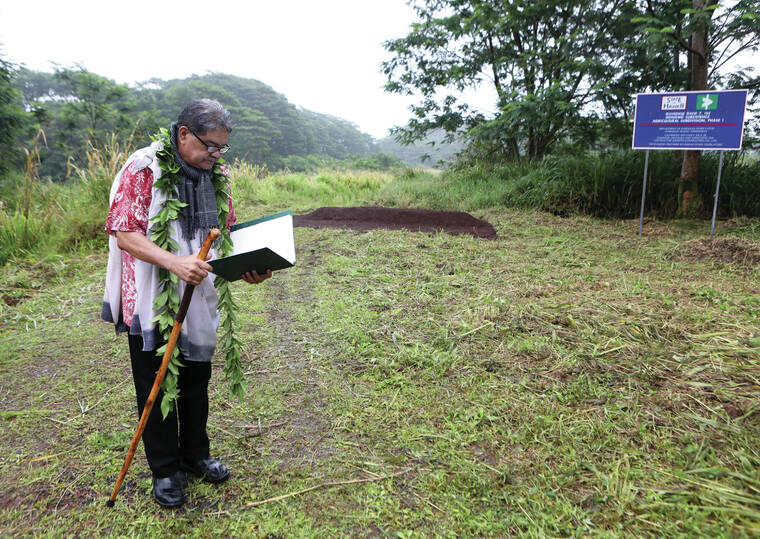The Big Island’s share of $600 million appropriated to the Department of Hawaiian Home Lands last year will be divided between two projects, according to the plan outlined in a report by the department.
The Villages of La‘i ‘Opua in Kailua-Kona would receive $67 million, and Honomu Subsistence Agriculture Lots Phase 2 would receive $6 million.
The report — the Strategic Plan to Implement Act 279 — describes itself as a “broad strategy” to reduce the waiting list of a reported 28,700 individuals seeking homestead, agricultural or pastoral lots.
According to the document, which was submitted to the state Legislature in January, the “majority of the funding will go to new homestead lot development.”
The bulk of the Big Island lots would be in Kona, where La‘i ‘Opua Village 1 and La‘i ‘Opua Village 2 would get 200 lots each.
“At this time, the determination whether new lots will be turn-key, older-builder or self-help has not been made,” the report states.
“The funding is for design and planning. And once they’re through with that, the design plans, it would also include a development agreement with a developer to develop homes,” Bo Kahui, executive director of the nonprofit La‘i ‘Opua Community Development Corp., said last week. “This may include some infrastructure funding, but I’m not sure how they are going to budget that.”
According to the document, the plans for La‘i ‘Opua Village 2 include bid proposals for Fiscal Year 2023 estimated at $44 million spread out over two years — $4 million in 2023 and $40 million in 2024.
“We are certain of one thing. The department doesn’t have water credits to develop any more housing here on the west side (of the Big Island),” Kahui said. “And the La‘i ‘Opua Development Corp. has been working with the department to develop the North Kona water storage facility.
“There’s a current landowner above Holualoa who we’ve worked with — La‘i ‘Opua CDC, along with the department’s Planning Division — to encumber (the landowner’s) lands for water source development. When that happens, there would be sufficient water to develop all of the homes in Kona.”
Kahui declined to divulge the identity of the landowner, but said the property is close to the Waiaha well that’s been out of commission since 2017 after a contractor’s cable broke and the well’s pump and other equipment sank to the bottom, where it was irretrievable.
The plan for La‘i ‘Opua Village 1 is slated for a bid proposal estimated at $23 million in 2025.
In addition, the construction of 40 new lots are proposed for development in East Hawaii at Honomu Subsistence Ag Lots, Phase 2.
The design is in progress for the Honomu project, and an invitation for bids in fiscal year 2024 is estimated at $6 million.
Ground was broken for the first phase of the Honomu Ag Lots in April 2022.
The proposed statewide DHHL capital projects plan is $540 million — $172.75 million for fiscal year 2023 and $367.25 million for fiscal year 2024.
“However, DHHL also plans to set aside roughly 10% of Act 279 funding for new and innovative programs that may be identified by beneficiaries and/or housing stakeholders that could help individual wait list applicants address barriers to home ownership,” the report states. That would account for why the proposed encumbrances in the report total $540 million, which leaves $60 million, or 10% of the $600 million appropriated.
The plan cited the 2020 Beneficiaries Study Applicant Report that found 76% of the individuals on the wait list prefer a lot with a single-family home or a vacant lot for a house, and 16% prefer to rent or rent-to-own a single-family home, duplex, apartment or townhouse with an option to buy in the future.
The document proposes the development of 2,727 lots with Act 279 funding statewide, with 1,525 lots, 56% of the total, on Oahu. Hawaii County’s 440 lots is 16.1% of the total.
There are numerous DHHL bills in the state Legislature this year, but only three specifically mention Act 279.
House Bill 567, if adopted, would exempt certain projects on DHHL lands from general excise taxes and make permanent the exemption of certain housing developed by the DHHL from school impact fees. It also would ensure that the $600 million appropriated to DHHL in Act 279 is available for expenditure until June 30, 2025, and make permanent the issuance of county affordable housing credits to the DHHL.
The measure passed through the Housing and Judiciary and Hawaiian Affairs committees with amendments. It’s scheduled to be heard at 2:30 p.m. today by the Finance Committee.
Companion appropriations bills ensuring the $600 million would be available for expenditure until June 30, 2025, also have been introduced.
The Tribune-Herald reached out to DHHL for comment, but didn’t receive a reply in time for this story.
Email John Burnett at jburnett@hawaiitribune-herald.com.






